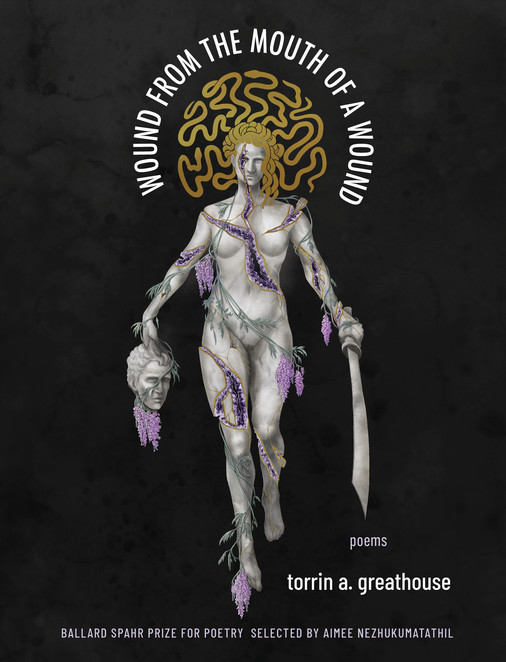Milkweed Editions, 2020 Paperback: $16.00
Reviewed by Robyn Katona

What a tongue. What delectable words torrin greathouse served us on pages of pages. About the body and the ugly, and beauty in the ugly and the body. As stated by her, let us “begin with the body.” Find comfort in the discomfort, the unpretty, find a sense of the mind following along the contours of the body in each poem. Especially the ones that challenge us the most, like “Metaphors for My Body on the Examination Table,” “Burning Haibun,” “The Queer Trans Girl Writes Her Estranged Mother a Letter About the Word Faggot & It Is the First Word to Burn,” “Metaphors for My Body, Postpartum,” and the one immediately challenging–the postscript poem.
In all honesty, each poem creates a puzzle few perfectly solve. I am not one of them, but who doesn’t enjoy a puzzle they could one day piece together and have a quaint “ah ha!” moment? Instead, these specific poems I mentioned created a strong drive of wanting to solve it. If you are a fan of discovery, open to the first page. We are already excavating, or autopsying, the first stanza.
“I do not want to speak about the beginning
of this story. Were my scalp a wreath or crown
of mouths, still, I would not open.
But you already know the myth: rape
That made the body punishment for itself.”
And in the literal sense, autopsy becomes speculative, metaphoric, possibly reverse-metamorphic depending on how we want to look at it. greathouse does not hold back on the trials and transitions of life she faces in reality. Unlike the predictable woe we might expect, the gaze of such details are gentle-fierce, soft pinches to the body to remind us the body is real, is malleable, and bloody.
Pinches can scar though, along with blood being unsightly on most occasions, Wound From the Mouth of a Wound does not shy away from including bold action, erratic behaviors, and aggression. This is not to say the body is not provided care, just as we move along from page to page, or wound to wound, we investigate the bruises, the healing process. As though a phoenix, greathouse writes, “I/ was just full of ash./ mother, I/ was/ born/ a/ flame.// You/ said/ you/ wanted/ a/ daughter/ till/ you had/ one/ me/ your/ child/ of/ ash.” Reborn out of ash, we soon enter the end of the collection, but the postscript refuses to return from what it was born out of. A justified refusal, but all the same I believe everyone that comes across “Ars Poetica or Sonnet to Be Written Across My Chest & Read in a Mirror, Beginning with a Line from Kimiko Hahn” will think how the heck do I solve this puzzle? Because imagine if you will this line in reversed lettering:
“I could not return to the body that/ contained only the literal world”
(The rest of this sonnet you’ll have to work out on your own because this poem does not hit as hard as it does its original format.) There are no accidents, mis-stitched sections, not a single misguided decision in this collection (or in greathouse’s life, because this is a masterpiece proudly on my bookshelf). We “instead begin with the body,” and stay in the anewed one, because the cliche ‘the body is a house’ perfectly suits how the title engages us for what is in store. A tongue twister on its own, we are wound up in a tangle of hair of mouths that threaten us yes–but are not poisonous, not any more dangerous than fire. Some may see the title as “wound” (noun) twice in the title, but when you read the opening poem, where the title emerges from, it is more likely we are entering a petite whirlwind, wound (verb) from the mouth of a wound (noun). We are swallowed by the body, solving puzzles that lead us to the tongue that formed this collection.